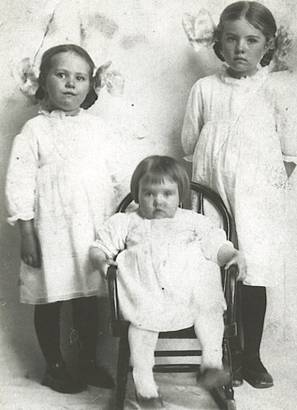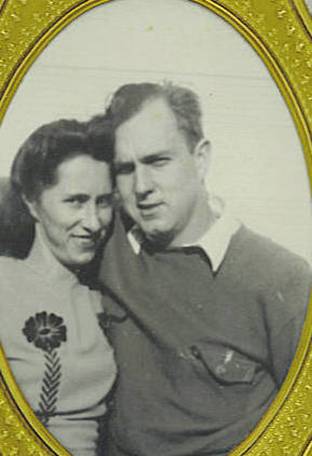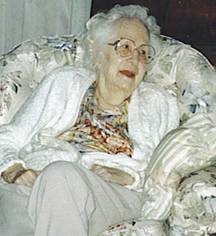The Holt Girls Sing Grandma to the other side
By Robert Locke

Mom, Aunt Pearl and Aunt Edna, ages 3, 5 and 1. Mom is the little angry one, at left, pouting because "I wanted to be the one in the chair," she told me laughingly shortly before her own death. How could she remember that? Well, that was Bess; she could always remember everything.
I guess I must be honest and say that it is hard to listen to this 8-minute clip.
Not just emotionally hard for me, but just plain hard. The recording wasn't great to begin with—on a cassette recorder in 1980 held clumsily on my mom's lap while she and four of her sisters sang hymns to Grandma a week before her death, Grandma lying on her sick bed and moaningly contributing as she is prodded into it. But just plain hard to listen to those croaky, quavery old lady voices.
What you do get out of it, however, if you try, is a picture of five sisters who had not sung together for more than 50 years but who must have made a gloriously robust sight and sound in their childhood in the 1920s, each in her one and only "good dress", singing out on the street corner to drum up sinners for their dad's preaching in whatever clapboard church he had been able to goad the townsfolk into erecting. Each girl played at least one musical instrument, guitar, banjo, mandolin, fiddle, tambourine, accordion, and they would have also played the piano inside the church, whenever they had one. Each girl would take a different part, not just soprano and alto but also tenor and bass.
Here on this clip, you hear their failing voices falling into place with harmonies growing stronger as they brought them back from old memories. The entire cassette is thirty minutes and by the time they came to the end, those old gals were really clipping along, and their four part harmonies were hitting more fully on target.
I include here "Amazing Grace", the first song they attempted because it was Grandma's favorite. "Now, come on, Mama, YOU sing," Aunt Edna prods.
The second song is "Precious Memories" and you can hear Aunt Edna—always and forever allowed the melody while the others take the harmonies—break down and start to gasp for air, her voice faltering and finally giving out as the other sisters one by one also drop out because of the fragility of the memories brought on by having just sung the phrase "Precious Father, Loving Mother...". But Aunt Edna soldiers on, and my mom Bess comes in to support her until the end of the song. It is heart wrenching to hear the love and courage in those voices.
The third song I've included is from the end of the cassette where the sisters have now finally found their stride with much stronger harmonies in "I'll Fly Away". Adding poignancy is the fact that these old ladies knew they were singing these words to their mother who was just about to fly away herself "to a home on God's celestial shore." It is a pretty good, bang-up job these sisters do on this hymn—until Mom accidentally cuts them off with a misplaced thumb—and musicologists should be interested to listen.
Historians, too—especially those who are looking for oral histories from the people of Oklahoma who made the migration to California during the Dust Bowl—will find pith in these voices, these hymns, this situation of five daughters singing their mother "over to the other side." All of these people came to California as they could manage to get here, brought one at a time by their sisters and brothers, with Grandma and Grandpa finally following their children, to end their life in this brand new country half a continent away from their original home.
I admit, though with a kind of shame, or perhaps only regret, that listening to this cassette in bed each night, with tears running down my cheeks, is what inspired me to write ON DADDY'S BIRTHDAY in the late 80s. The regret comes from the fact that ON DADDY'S BIRTHDAY is such a gross and disgraceful play with the blackest of themes, with ungodly humor and a god-awful outcome. There is a kind of betrayal there by me of my sweet mother and aunties and grandma. And I am sorry for that. But, gee, I am a playwright.
And no, the three sisters in ON DADDY'S BIRTHDAY are not really among these five sisters on the cassette. But yes, they kind of are.
And no, that monster Clyde Starr, is not my grandpa, Preacher Grover Holt. But yes, he kind of is.
I asked my Aunt Mary once if it was true, what I had heard somewhere as a kid, that Grandpa had put a mother cat into a barrel with three big rats to watch them fight to the death to see which would win; also that he had tied two cats' tails together and hung them over a clothesline. Aunt Mary said yes. That is still hard to believe, but she did tell me yes.
Violet Ruby is sort of like Aunt Mary and Aunt Jane combined, my two youngest aunties, both beautiful and with at least some thoughts of making herself a star.
Rose Jewel is sort of like Aunt Pearl and Aunt Edna, very pious and—I guess I have always thought—selfish and rather simple-minded in certain ways.
Marge is sort of like my mom and my Aunt Bert, favorite sisters ten years apart, practical, down-to-earth, goodhearted and warm and with great senses of humor.
The five sisters on the cassette must have pretty much spanned the ages of 60-70, Pearl the oldest, then every two years or so apart, my mom, Aunt Edna, Aunt Bert and Aunt Mary.
Missing here from the original family of nine children were the two boys, Uncle Tom and Uncle Culley—also singers, Uncle Culley with his fabulously smooth and deep bass voice being one of the original quartet The Jordanaires who went on to fame as Elvis Presley's back up singers—but who were both dead by this time, mainly of alcohol abuse I would say; also my mother's "wayward sister" Edith who died in a bar at age 50—falling off a barstool, we were told; and finally the youngest sister, Aunt Jane, who was living out of state and did not get to Aunt Pearl's house in time for this gathering.
Within a week of the recording Grandma died and was placed with Grandpa in his crypt—facing east "so I'll be able to see Jesus when He comes"—in the cemetery up on the hill where now so many more of my family have joined them, including my mom and dad and my brother Richard. My gravestone is already in place there, with theirs, all conjoined by a base on which is engraved this poem I wrote as a lyrical line for one of the songs in HOWLING TWAIN:
Echo of centuries, remember. Remember, you're not here alone. If voices are muted, The words are engraved in stone. Oh, remember, you're not here alone.

Mom and Dad, in love and so good, shortly before I was conceived. Well, I think you can see that look in both of their eyes, that they knew something that I did not. That was so often the case.

Mom at age 90, looking so much like Grandma at the same age.